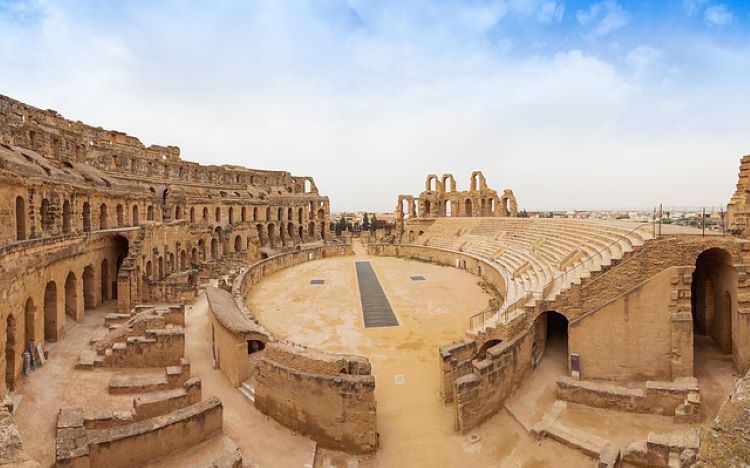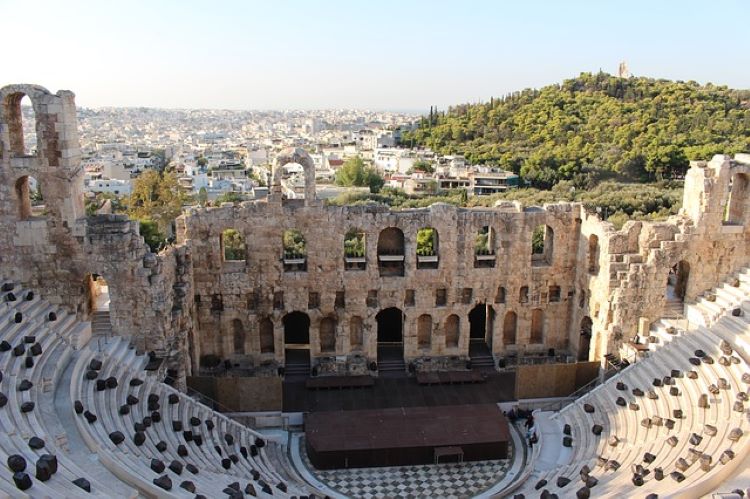The history of theater began in Ancient Greece, around the 6th century BC. At that time, rituals were performed in praise of the mythological god Dionysus, a deity related to fertility, wine and entertainment.
Thus, the theater appears in this context and as a result of these parties.
Theater in prehistory
Despite being a consensus that Western theater originated in Ancient Greece, it is important to emphasize that this manifestation has been present in humanity since ancient times, even if in a rudimentary way. In prehistory, human beings had different ways of communicating, and imitation was one of them. Most likely, cavemen developed gestures that resembled animals. In addition, they staged hunts to tell their peers how the situations occurred.
Like dance, music and drawing, theatrical language also had its importance in prehistoric times.
Theater in Ancient Greece
The celebrations of the God Dionysus lasted for several days and took place at harvest time, as a way of thanking him for the food and wine.
Citizen participation was intense and there was a kind of procession, which was called “dithyrambo”. Then came the “choir”, a group of people who sang and danced in honor of Dionísio.
Until Téspis appears, a figure of great importance for the emergence of Western theater. This man reportedly participated in one of these rituals when, at one point, he decided to wear a mask and say that he was the god Dionysus himself, thus initiating a dialogue with the “choir”.
The boldness of such an attitude made Téspis recognized as the “creator of the theater” and the first actor and theater producer.
Later, this artistic language evolved and strongly influenced Roman theater and other cultures.
From an architectural point of view, the structure of the first theaters was similar. The presentations were made outdoors, in semicircular shapes.
There was a space for performances, called an orchestra. The place to accommodate the public was the grandstand, built on mountainous slopes, which facilitated the acoustics.
The stage, on the other hand, was the place where the actors prepared for the performance and kept the costumes and stage objects.

Theater in Ancient Rome
Roman theater had enormous influence from Greek theater, as well as other cultural manifestations of this people. Etruscan culture was also a relevant factor in the development of Roman theatrical art.
However, the Romans brought some changes in this language. The most significant of these is with regard to the architectural structure, which was previously made on hillsides by the Greeks and then started to incorporate arches and vaults by the Romans.
The themes and objectives of Roman theater have also changed somewhat, with the appreciation of more entertainment (such as gladiator and animal fights) and less religious issues.
Medieval theater
After the Roman Empire declined, the Middle Ages began, comprising the 5th to 15th centuries.
In medieval times, for many years, theatrical language was banned in Europe. This was because it was considered by the Catholic Church as a sinful activity, reappearing only in the 12th century.
Thus, the purpose of medieval theater was the dissemination of religious precepts and biblical stories, being performed by members of the clergy. In this way, priests used this expression to transmit teachings from the Catholic Church.
One of the most notable people in this context was Father Anchieta, who devoted himself strongly to the so-called catechesis theater.
Theater today
Nowadays, this way of expressing yourself artistically has very different characteristics from those that defined it in the beginning. The demonstration evolved throughout history, also being presented in closed spaces, which ended up restricting and elitizing its audience. The forms of acting have changed and the purpose of the shows has also changed, and it is possible to find several theatrical aspects today.
Curiosity
Theater is a word that has its origin in the Greek term theatron. Its meaning is related to a set of theatrical shows and the place where these presentations take place.

